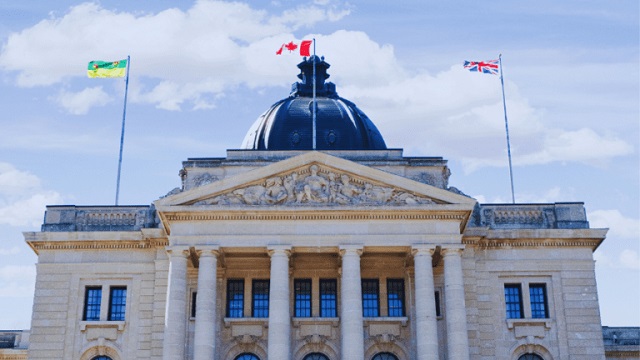By Dave Snow
Across 38 articles, the CBC quoted more than five times as many critics of Saskatchewan’s policy as supporters.
A common argument in favour of defunding the CBC is that its news content exhibits ideological bias. In particular, it has been subject to criticism that it is too progressive and Liberal-friendly, including for instance in its recent coverage of the Israel-Hamas war and Chinese interference in Canadian elections.
However, the assumption of the CBC’s progressive bias has rarely been tested empirically. To remedy this, I conducted an analysis of the CBC’s coverage of an issue that became a sustained national news story this past fall: Saskatchewan’s parental consent policy for children’s gender pronoun changes in schools.
The public debate around Saskatchewan’s pronoun policy involves complexity, competing perspectives, and evolving public opinion. It’s the sort of issue for which the role of the news media is presumably to establish and situate the facts, present the different points of view, and help Canadians work through the nuances. Yet, as my analysis shows, that’s not how the CBC’s reporting handled the issue.
Before describing the CBC’s coverage, it’s necessary to briefly describe the genesis and substance of the Saskatchewan government’s policy. In August, the government announced it would require parental consent for students under 16 to change their names or gender pronouns at school. The policy was challenged in court by the University of Regina Pride Centre for Sexuality and Gender Diversity (“UR Pride”), and on September 28, Justice Megaw of the Court of King’s Bench issued an injunction pausing the operation of the policy because of “the potentially irreparable harm and mental health difficulty” for students “unable to find expression for their gender identity.”
Later that day, Saskatchewan Premier Scott Moe announced that his government would respond to the injunction with a law invoking the notwithstanding clause. On October 20, that law, called the Parents’ Bill of Rights, was passed. The law stipulates that if a child under 16 requests that a “new gender-related preferred name or gender identity be used at school,” teachers and school employees “shall not use the new gender-related preferred name or gender identity unless consent is first obtained from the pupil’s parent or guardian.”
As a high-profile issue involving a clash of rights, Saskatchewan’s pronoun policy serves as an ideal case study to examine how the CBC covers contentious social policy disputes. To do so, I conducted a content analysis of all of the CBC’s written articles about Saskatchewan’s pronoun policy from August 22, 2023, the day the government announced its initial policy, to October 22, 2023, two days after the Parents’ Bill of Rights became law. During this period, the CBC published 38 news stories in which Saskatchewan’s policy featured prominently, six of which were written by journalists working for the Canadian Press.
Even before reading the articles, the headlines betrayed the direction of the CBC’s coverage: while no headline made an explicit argument against the policy, fourteen (37 percent) contained what I call “attributed criticism” of Saskatchewan’s policy—denunciation from someone other than the reporter. Examples include “Families of trans kids, activists say they’re angered, scared, disgusted by Sask.’s pronoun law” and “Sask. Opposition says pronoun and naming policy motivated by politics, transphobia.” By contrast, not one of the 38 articles contained attributed praise of the policy; the closest, “Sask. premier touts survey showing support for informing parents of name, pronoun changes in school,” referenced the Premier himself.
As these headlines show, CBC reporters relied heavily on outside sources to describe the policy’s purported impact. To determine who those sources were, I coded every person or organization quoted in the 38 articles into three categories: supporters of the government’s policy, critics of the policy, and sources who were neutral towards the policy (I excluded quotes from the government, politicians, and the judicial injunction itself). I also distinguished between those whose opinions were clearly sought by the CBC and those whom the CBC quoted from the public record.
Across 38 articles, the CBC quoted more than five times as many critics of Saskatchewan’s policy as supporters (81 critics, 15 supporters, and five neutral). Moreover, supporters were grouped into a small number of articles, with six of the 15 supporters quoted in a single story about competing public rallies. Only 16 percent of the total articles (six of 38) quoted at least one supporter of the policy, compared to 95 percent of articles (36 of 38) that quoted at least one critic of the government’s policy. And support was never presented independent of criticism: all six articles that included a quote from a supporter also included at least one quote from a critic.
The critics quoted by the CBC were also far more likely to be in a position of authority, while supporters were almost entirely laypeople. Of the 59 critics whose opinions were sought out by the CBC, 26 were what I classify as “experts”—lawyers and legal scholars, professors, school board presidents, health professionals, and LGBTQ organizations—and a further six were teachers. The focus on expertise was even higher from those quoted from the public record: of the 22 critics who were quoted from the public record, twenty (91 percent) were experts or organizations representing experts. By contrast, CBC reporters did not seek out a single “expert” to speak in favour of Saskatchewan’s policy. Of the 15 quotes from supporters that were sought by the CBC, 11 were from community members or protestors at rallies, while four were from the leaders of three small socially conservative interest groups.
The only expert the CBC quoted in defence of the rationale behind Saskatchewan’s policy (from the public record) was Dr. Erica Anderson, a clinical psychologist and a trans woman who presented an affidavit for the Saskatchewan government in court. The CBC article presented Dr. Anderson in a negative light, calling her a “vocal critic” of youth gender transition while failing to mention her decades of research and clinical experience. Most egregiously, the CBC article did not quote from Dr. Anderson’s affidavit even though the affidavit was the topic of the article (and even though much of it was quoted in the publicly available judicial injunction). Yet the same article included a quote from UR Pride’s legal counsel criticizing Dr. Anderson’s affidavit.
The selective presentation of content was even more apparent when it came to the CBC’s reporting on public opinion polls. Between August and October 2023, three Canadian polls were released regarding pronoun changes at schools. To understand the content of these polls, it is important to conceptualize of three policy options when it comes to informing parents when their child seeks to change gender pronouns at school. These fall along a continuum:
- Option A: Require that a child’s parents must be informed and require consent for any pronoun changes. This was the policy Saskatchewan ultimately chose.
- Option B: Require that parents be informed, but not require their consent.
- Option C: Neither inform parents nor require their consent.
On August 28, the Angus Reid Institute released a poll (though its data had been collected before Saskatchewan’s policy announcement). The poll showed that 50 percent of Saskatchewan residents believed parents should be informed of and provide consent for any changes (Option A); 36 percent of Saskatchewanians thought parents should be informed only (Option B); and only 10 percent said parents should be neither informed nor provide consent (Option C).
The day the poll was released, Saskatchewan’s Premier posted its results on X, highlighting that 86 percent of Saskatchewan residents support “some level of notification for parents when children want to change their gender identity in school.” This, of course, was a sleight-of-hand: Premier Moe’s statement elided the fact that only 50 percent of respondents thought parental consent should be required, which was his government’s policy.
Yet the CBC’s reporting engaged in a similar sleight-of-hand. In the CBC news story about this poll, its subhead read “Survey shows split on whether schools should require parental permission.” The CBC article framed the issue as permission vs. non-permission (Option A vs. Options B and C combined) where a 50-46 split indeed existed. However, none of the critics of Saskatchewan’s policy quoted by the CBC, in this article or in any other, recommended Option B. Of the 81 criticisms of Saskatchewan’s policy quoted across 38 CBC articles, not one said, “We think the Saskatchewan law goes too far, but we support a middle ground where informing parents should be a requirement.” By framing the survey results as “split,” but only giving voice to sub-position within one side of the split that had 10 percent support in Saskatchewan, the CBC overstated the extent to which critics of the law had public support for their position.
Even more concerning was how the CBC reported (or didn’t report) two subsequent polls. On October 12, polling firm Leger released survey results on gender identity and sexual orientation. Unlike the Angus Reid poll, this poll gave respondents only two options: “Schools should have to let the child’s parents know” about pronoun changes (combining Options A and B above), or “schools should not have to let the child’s parents know” (Option C). Although not as strong a divide as the Angus Reid poll, respondents still supported informing parents by an almost three-to-one margin, with 63 percent saying parents should be informed, 22 percent saying no, and the rest unsure.
As the Saskatchewan government had just invoked the notwithstanding clause to pass its law, the Leger survey also asked respondents “How much would you support or oppose your province using the ‘notwithstanding clause’ in the Constitution to ensure schools must inform parents if their child wishes to be identified by a different gender or have their gender pronoun changed?” Respondents supported the use of the clause by a roughly three-to-two margin: 46 percent supported the use of the clause, 31 percent opposed it, and 22 percent did not know.
A day before Leger released its poll, polling firm spark*insights had also released a poll commissioned on behalf of Egale Canada, an LGBTQ advocacy group that was involved in the litigation against Saskatchewan’s law. Unsurprisingly, this survey framed its questions rather differently. On the question of informing parents, spark*insights asked respondents whether a teacher should have “the discretion to not inform a parent if there is a credible risk to believe telling a parent could put the student at risk.” The inclusion of “credible risk” led to different results than the Leger results: 51 percent of respondents agreed that the teacher should have the discretion, while 49 percent said the teacher should have to inform the parent (the numbers for Saskatchewan residents were slightly more in favour of teacher discretion, 55 percent to 45 percent).
On the notwithstanding clause, the spark*insights survey prefaced its question by saying “A court has ruled that the policy will likely cause irreparable harm to affected children under the age of 16.” With the inclusion of the language of “irreparable harm,” only 27 percent of respondents agreed that Saskatchewan should “use legislative powers to immediately overrule the court and enact the law,” while 73 percent said the government “should allow the courts to review the policy before taking further action” (the numbers were 32 percent and 68 percent for Saskatchewan residents).
Of course, by inserting the language of “credible risk” and “irreparable harm,” the spark*insights survey is a textbook example of how not to frame unbiased polling questions. This is clear when the results are contrasted with the Leger poll released only a day later. Whereas Leger’s neutral framing showed a three-to-one ratio on informing vs. not informing parents, the spark*insights “credible risk” ratio was one-to-one; whereas Leger’s neutral framing showed a three-to-two ratio in favour of the notwithstanding clause, the spark*insights use of “irreparable harm” produced a nearly one-to-three ratio on the same topic.
Thus two surveys with differently-worded questions released a day apart produced very different results. How did CBC report on this disjuncture? Simple: it reported on the spark*insights poll, but not the Leger poll.
Whether deliberate or not, the omission of any mention of Leger’s poll was arguably the most damning aspect of the CBC’s coverage of Saskatchewan’s pronoun policy. Indeed, the CBC published 11 articles about Saskatchewan’s pronoun policy in the 10 days after Leger’s survey was released, none of which mentioned the poll. And it is not as if the poll flew under the national radar: it was the subject of a news story written by a Canadian Press reporter and published by CTV News, Global News, The Globe and Mail, and the Toronto Star. The CBC had even used a Canadian Press story about Saskatchewan’s pronoun policy by the same author a month earlier. Yet somehow, a poll that happened to complicate the CBC’s preferred narrative on Saskatchewan’s pronoun policy was simply not mentioned in the CBC reporting.
The above analysis lends empirical weight to what many have long suspected regarding the ideological tilt of the CBC’s news coverage. Perhaps even more troubling, however, is the lack of curiosity present in the CBC’s reporting on Saskatchewan’s pronoun policy. The 38 CBC articles were written by a combined 15 reporters, 13 of whom were CBC employees. Yet there was virtually no attempt to understand the justifications for a policy of informing parents about their children’s pronoun changes. The articles weren’t just one-sided; they were entirely predictable.
Perhaps this can explain why Canadians are increasingly shrugging their shoulders at the idea of a defunded CBC. If the CBC continues to push allyship over objectivity—and to do so in a way that leads to a less informed public—its $1.3 billion annual public subsidy will become increasingly harder to defend.
Dave Snow is an Associate Professor in Political Science at the University of Guelph.
Related
















